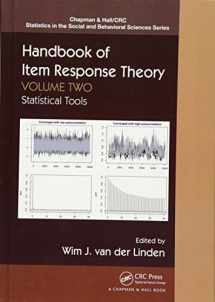
Handbook of Item Response Theory: Volume 2: Statistical Tools (Chapman & Hall/CRC Statistics in the Social and Behavioral Sciences)
Book details
Summary
Description
Drawing on the work of internationally acclaimed experts in the field, Handbook of Item Response Theory, Volume Two: Statistical Tools presents classical and modern statistical tools used in item response theory (IRT). While IRT heavily depends on the use of statistical tools for handling its models and applications, systematic introductions and reviews that emphasize their relevance to IRT are hardly found in the statistical literature. This second volume in a three-volume set fills this void.
Volume Two covers common probability distributions, the issue of models with both intentional and nuisance parameters, the use of information criteria, methods for dealing with missing data, and model identification issues. It also addresses recent developments in parameter estimation and model fit and comparison, such as Bayesian approaches, specifically Markov chain Monte Carlo (MCMC) methods.


We would LOVE it if you could help us and other readers by reviewing the book
Book review



